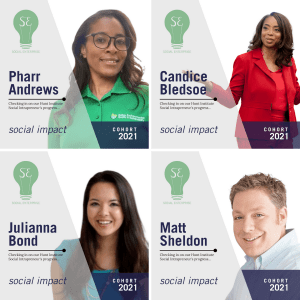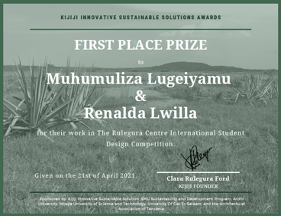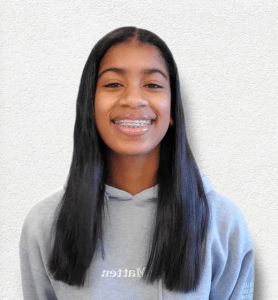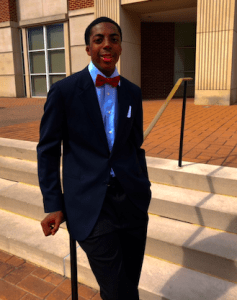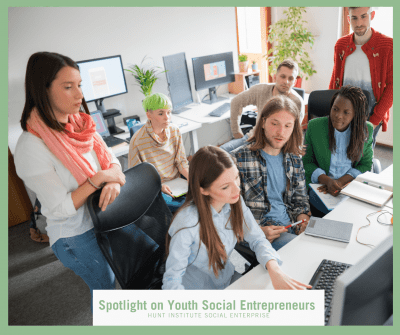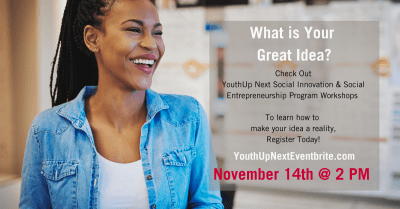In our Social Enterprise program, we believe that intrapreneurship can bring together the best of both worlds: the innovation and dynamism of entrepreneurship, and the resources and market platform of existing organizations. Research has repeatedly demonstrated the benefits of intrapreneurship, and an increasing number of organizations are implementing programs to proactively and intentionally encourage intrapreneurship, especially in the business community. Social intrapreneurship is a more recent and somewhat lesser-known concept. Social intrapreneurship combines social entrepreneurship, the mindset of pursuing bold ideas and innovative solutions to address social and environmental problems, with intrapreneurship.
Since launching the 2021 Social Enterprise cohort at the beginning 2021, each of the four social intrapreneurs has made significant strides in pursuit of their transformational ideas for a climate-smart and inclusive economy. As this semester comes to a close, we want to highlight their progress.
Ms. Andrew’s project aims to find solutions to address the energy poverty gap. In March, she served as a panelist at ImpactNights® and helped spark the discussion around reducing the energy burden for LMI households. Throughout the semester, she has worked to increase awareness of the issue and the urgent need for action. This month, the Hunt Institute and Pharr will be hosting a virtual workshop to bring together key stakeholders to collectively develop clear next steps to get more homes weatherized. If you are in a position to assist with this project, don’t hesitate to contact Pharr Andrews via LinkedIn.
Dr. Bledsoe’s work is focused on developing youth as change agents and young entrepreneurs. Last month, the Action Research Center, founded and directed by Dr. Bledsoe, hosted the annual Cutting Edge Youth Summit, bringing together students, parents, teachers, and community leaders to learn about the importance of leveraging cultural wealth to become agents of change. To date, the program has supported 2,513 students and 785 parents. This summer, Dr. Bledsoe will be working to connect her various initiatives under the Action Research Center umbrella in order to expand her impact.
Julianna Bond’s project focuses on enabling the enablers: how can consulting firms use their unique position – straddling organizations, industries, and sectors – to accelerate innovation and amplify social impact? Ms. Bond spent the semester conducting a deep dive into the processes and resources that already exist in this space. Over the summer, she hopes to develop an initial draft of a framework for empowering consultants to serve their local communities and champion sustainability.
Matt Sheldon’s initiative aims to create a circular system to recover food waste and bioplastics and convert them into energy. This system has many benefits, namely: diverting waste from landfills, reducing greenhouse gas emissions, and creating new revenue streams. This semester, Mr. Sheldon has held numerous meetings with stakeholders across DFW who are interested in partnering with him on this type of solution. Over the summer, he plans to conduct the economic analysis necessary to move the project forward.
“From governments to leading think-tanks, foundations and global corporations, we have been observing expressions of support and anticipation that social entrepreneurs and social enterprises will play a critical role in rebuilding after the pandemic and steering our society towards a more sustainable and inclusive economy. But the challenges faced by social entrepreneurs and enterprises remain significant. The purpose of our program is to help understand these challenges, identify proven best practices to tackle them and to empower the most promising social entrepreneurs in our local community to put their ideas into action and to maximize their impact.” Dr. Eva Csaky, Executive Director of the Hunt Institute and founder of the Social Enterprise program in the Institute.
Stay tuned to the Hunt Institute Digest for more updates on the 2021 Social Enterprise Cohort of social intrapreneurs as they continue working on their initiatives this summer.
To read more about the Hunt Institute’s work to develop future-focused solutions to some of the world’s biggest problems, please click here. For the latest news on the Hunt Institute, follow our social media accounts on LinkedIn, Facebook, Twitter, and Instagram. We invite you to listen to our Podcast called Sages & Seekers. If you are considering engaging with the institute, you can donate, or sign-up for our newsletter by emailing huntinstitute@smu.edu.

